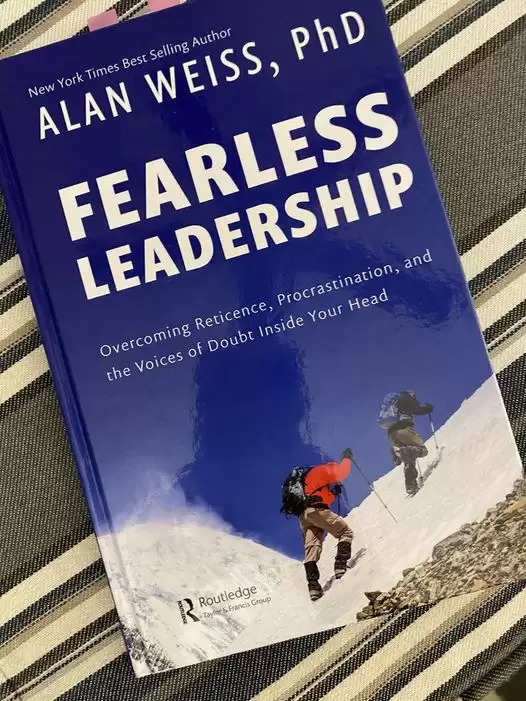7 Key Lessons from Alan Weiss's "Fearless Leadership"

In his insightful book "Fearless Leadership," Alan Weiss delves into the intricate dynamics of effective leadership, offering a roadmap for leaders seeking to overcome obstacles and cultivate a thriving organizational culture. The lessons he presents are not merely theoretical; they are practical strategies that can be implemented to enhance one's leadership journey. Here, we explore seven profound lessons that Weiss articulates, each offering a unique perspective on what it means to lead with confidence and authenticity.
1. Overcoming Fear as a Leader
One of the most significant barriers to effective leadership is fear. Weiss emphasizes that fear can paralyze decision-making and stifle innovation. He provides concrete strategies for leaders to confront and overcome their fears, urging them to view challenges as opportunities rather than threats. By adopting a fearless mindset, leaders can make bold decisions that inspire confidence in their teams. This involves embracing risks, understanding that failure is often a stepping stone to success, and fostering a culture where team members feel empowered to take calculated risks themselves.
2. The Importance of Self-Awareness
Self-awareness is a cornerstone of effective leadership, according to Weiss. He argues that understanding one’s strengths and weaknesses is essential for navigating the complexities of leadership. This self-knowledge allows leaders to identify emotional triggers and manage their reactions in high-pressure situations. When leaders are in tune with their own motivations and behaviors, they can connect more authentically with their teams, creating a more cohesive and engaged workforce. This genuine connection fosters trust, which is vital for collaboration and collective problem-solving.
3. Taking Decisive Action
In a fast-paced business environment, indecision can be detrimental. Weiss underscores the importance of taking decisive action. He argues that procrastination can hinder progress and that leaders must learn to act swiftly, even in the face of uncertainty. This decisiveness not only propels projects forward but also instills a sense of direction and purpose within teams. When leaders make timely decisions, it encourages a culture of initiative among team members, empowering them to take ownership and drive results.
4. Challenging Limiting Beliefs
Weiss encourages leaders to identify and confront the limiting beliefs that often hold them back. These beliefs, rooted in fear or self-doubt, can create significant barriers to personal and professional growth. By recognizing these internal constraints, leaders can shift their mindsets, allowing them to pursue opportunities they previously deemed unattainable. This process of challenging limiting beliefs is transformative; it enables leaders to unlock their full potential and encourages their teams to adopt a similar mindset of growth and possibility.
5. Building Trust and Accountability
Trust is foundational to effective leadership, and Weiss emphasizes the need for leaders to cultivate an environment of accountability. By fostering trust, leaders create a safe space for team members to express their ideas and take responsibility for their actions. This environment not only enhances collaboration but also boosts morale, as team members feel valued and heard. Leaders must model accountability themselves, demonstrating that they stand by their commitments and encourage their teams to do the same. This mutual accountability strengthens relationships and drives organizational success.
6. Embracing Vulnerability
Weiss discusses the often-overlooked power of vulnerability in leadership. By being open about their challenges and uncertainties, leaders can create deeper connections with their teams. Vulnerability fosters a culture of openness and collaboration, allowing team members to feel comfortable sharing their thoughts and concerns. When leaders model this behavior, it encourages their teams to engage more authentically, leading to enhanced creativity and problem-solving. Embracing vulnerability not only humanizes leaders but also builds stronger, more resilient teams.
7. Continuous Learning and Growth
Finally, Weiss emphasizes that leadership is an ongoing journey of learning and growth. He advocates for leaders to actively seek feedback, embrace new experiences, and remain adaptable to change. This commitment to continuous improvement ensures that leaders evolve alongside their teams and the ever-changing demands of their roles. By fostering a mindset of lifelong learning, leaders not only enhance their own capabilities but also inspire their teams to pursue growth, ultimately leading to a more innovative and dynamic organizational culture.
In conclusion, the lessons presented in "Fearless Leadership" serve as a powerful guide for those seeking to lead with integrity and confidence. By overcoming fear, cultivating self-awareness, taking decisive action, challenging limiting beliefs, building trust, embracing vulnerability, and committing to continuous learning, leaders can navigate challenges effectively and inspire their teams to reach new heights. These principles provide valuable insights into the mindset and practices necessary for effective leadership in today’s complex world.

Book: https://amzn.to/47SuKud
--
-- Thanks For Reading --
You Might Also Like: The Biggest Bluff: How I Learned to Pay Attention, Master Fear, and Win
